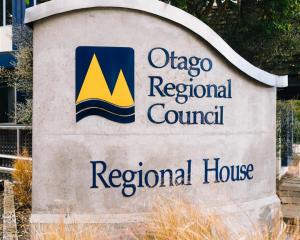This coming year we will celebrate the 150th anniversary of the discovery of gold in Otago. The first of this region's "big projects".
This coming year also marks the 21st anniversary of the formation of the Otago Regional Council (ORC).
It is also a time when a number of regions (provinces) elsewhere in New Zealand are pondering their administrative future - notably Auckland and Canterbury.
The ORC agenda these days often ranks well beyond the scope adopted by the former Otago Catchment Board - which was formed back in the late '40s.
The earlier board's role lay in the care and good stewardship of the Otago pastoral farming landscapes and especially its water and soil resources.
In these matters the ORC has developed major policy statements on water and air, with guidelines often determined by the 1991 Resource Management Act.
That Act and its more recent amendments focus very much on public accountability, transparency, contestability and especially sustainability.
I think that there are good grounds to add "restoration" in matters relating to biodiversity, clean air and fresh water.
Unfortunately, the ORC has failed to deliver as yet a formal policy statement on our soils - their biological health and good management.
It would be encouraging in this the International Year of Biodiversity were the ORC to prepare a major soil policy document.
After all, the biological health of our soils is a fundamental factor in biodiversity.
I still believe that the commitment of its ratepayers to an outlay of more than $80 million to the big spectator sports stadium over the next 15 years has been a poor choice of council spending.
The former Otago Catchment Board gave much attention to the sustainability and restoration of our strictly limited versatile soil resource. Surely the ORC can afford to employ at least one professional soil specialist to lead a programme of soil biology in this International Year of Biodiversity.
In recent decades the big ticket items of Otago expansion have included the conversion of inherited tussock lands to pastoral farming management, the tapping of major river hydro-electric potential, the creation of major commercial exotic softwood (conifer) plantations, the spectacular growth of the University of Otago, major irrigation schemes, stonefruit and pipfruit orcharding, the Port Chalmers international container port facility, opencast goldfields, vineyards and pinot noir grapes, internationally renowned skifields and tourism - including the recently introduced large cruise ships.
The list is impressive, but there is more in the wings: large-scale wind farms, lignite conversion to diesel fuel, offshore drilling for oil and gas.
Unfortunately, we have seen a steady closure of large manufacturing enterprises such as the earlier Ross and Glendining and Mosgiel, Milton and Oamaru-based woollen mills to the recent loss of the fine Fisher and Paykel domestic appliance firm.
Adding value to our primary products such as wool, timber and electricity has been difficult to manage with our principal markets so distant.
Looking at the global village, continued population expansion, increasing consumerism and the planet's finite resource base, the agenda is moving relentlessly towards prosperity without growth and perhaps the renaissance of craftsmanship.
Rural landscape values have come under unprecedented scrutiny in recent times.
This follows the spectacular spread of lifestyle settlement - concentrated in the Central Otago-Queenstown Lakes districts but also along the increasingly favoured coastal frontages.
It also embraces a worry about the introduction of large-scale industrial energy projects into cherished wild lands.
A much-discussed item in these matters concerns the spread of wilding trees on privately owned farmland, especially in and around the Wakatipu Basin.
And to their credit, some volunteers have spent many hours in eradication of unwanted trees from hot spots.
My forestry research colleague, Nick Ledgard, has been a strong advocate for pre-emptive management of the spread beyond initial commercial plantations and shelter wood lots and I concur with this sound advice.
In such matters it is worth quoting from former judge Arnold Turner (a retired principal judge of the Planning Tribunal): "It is necessary for every community to have a common ethic governing its relationship with the natural world.
If the community does not have a common environmental ethic, its debates about the environment will be reduced to a Darwinian struggle of special-interest groups, where power, not morality, rules" (AGM New Zealand Institute of Forestry Inc, Napier, 1993).
Big changes are taking place in Otago (and its neighbouring regions) and there is room for widely representative discussion on our vision for the next couple of decades.
In such a discussion we need to listen carefully also to those who have recently settled here from personal choice.
• Jolyon Manning was chief executive officer of the former Otago Council Inc.












